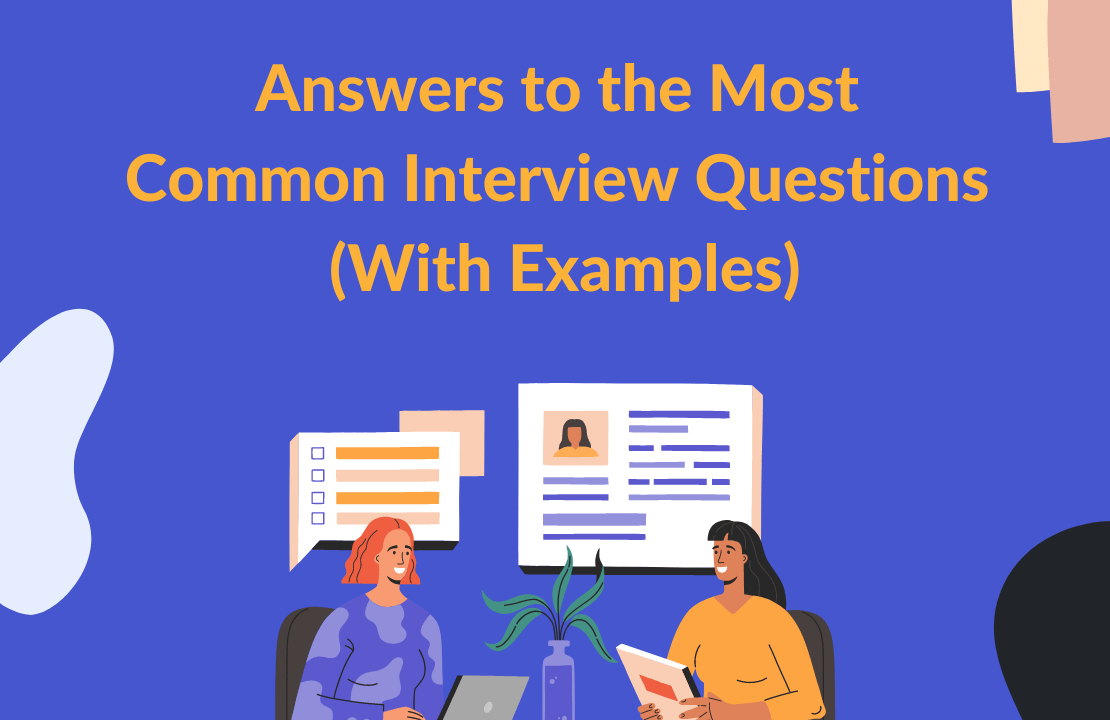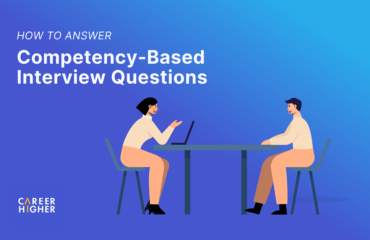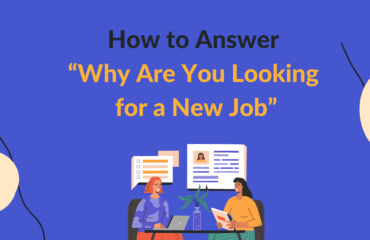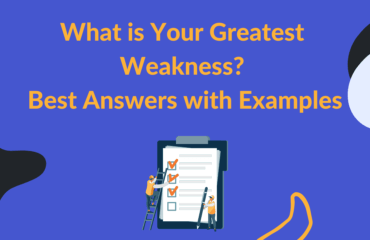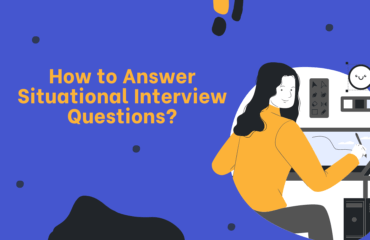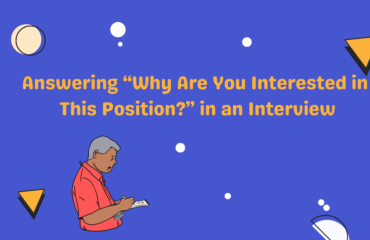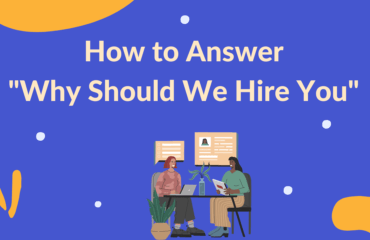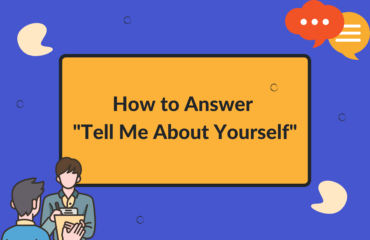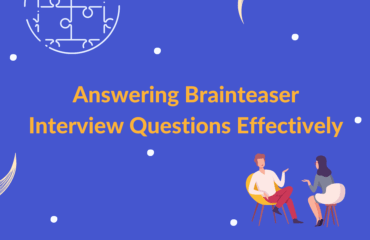Table of Contents
- Top 15 Most Common Interview Questions
- 1) Tell me about yourself.
- 2) Why do you want this job?
- 3) How did you hear about this position?
- 4) Why should we hire you?
- 5) What type of work environment do you prefer?
- 6) What is your biggest strength?
- 7) What do you consider to be your greatest weakness?
- 8) What are your salary expectations?
- 9) How do you handle stressful situations?
- 10) What is your proudest professional accomplishment?
- 11) Why did you leave your most recent job?
- 12) Have you applied to other companies?
- 13) What motivates you?
- 14) Where do you see yourself in five years from now?
- 15) Do you have any questions for us?
- Bonus List (Common Interview Questions)
- Different Types of Interview Questions
Job interviews can be stressful and intimidating for all candidates, whether you’re just starting out or have years of experience. While it’s impossible to predict the exact interview questions you’ll face, there are some questions that hiring managers are likely to ask in a job interview. With effective interview preparation and practice, you can answer these questions smoothly and land your dream job. In this article, we have collated a list of the most common interview questions and the best ways to answer them.
Top 15 Most Common Interview Questions
1) Tell me about yourself.
This one is an old favorite amongst hiring managers and is typically one of the first questions to come up. The interviewers love to ask this as it enables them to gauge your personality quickly and assess how prepared you are. By providing an impressive response, you can set a positive tone for the rest of the interview.
Interviewers love a good story. Thus, rather than narrating your life history, we suggest infusing your answer with powerful anecdotes to evoke the interviewer’s interest. To craft a well-balanced response, cover three aspects about yourself: Professional, Academic, and Personal. Typically, your professional experience should constitute the biggest chunk of your answer.
We recommend structuring your response using the Past, Present, and Future formula. Start with a story that fostered your interest in the field, then delve into your current role and achievements. Conclude your answer with what you’re looking to do now and why the intended position would be perfect. Remember to keep your answer crisp and concise; aim to wrap it up in under 120 seconds.
Sample Answer:
I have been fascinated with start-ups ever since I was a young girl. Growing up, I witnessed my grandmother set up her bakery to support the family in difficult times. Seeing her entrepreneurial journey, I developed a deep interest in running of young enterprises. Following my inclination toward business, I pursued a Bachelor’s in Business Administration at XYZ University.
After graduation, I joined ABC Company, a leading fashion technology start-up in London. I have led several growth initiatives to expand the company’s consumer base, resulting in 42% year-on-year growth. Through my experience, I have gained expertise in business development, retail marketing, and partnerships.
I am now excited to join work at a young start-up like yours, which is reshaping sustainable fashion. I believe I have the suitable skill set and experience to add value to your company as a Growth Manager.
Read More: How to Answer “Tell Me About Yourself” in an Interview
2) Why do you want this job?
The purpose of this interview question is two-fold. The hiring manager wants to see if you’ve taken the initiative to understand the job role and the company and if your professional goals are aligned with the company’s needs. It is another way of asking, “Why do you want to work here?”
While crafting your answer, first evaluate the employer’s strengths: what growth opportunities are they providing their employees? Why do professionals choose to work for them instead of their competitors? What contributions have they made to the industry and the community? By establishing the desirability of the particular company, you can set the context of your answer. After which, you can focus on what you bring to the table and how you can add value to the organization.
Sample Answer:
I greatly admire how company X has revolutionized the education sector in the United Kingdom by leveraging emerging technologies. Your mission to make quality education accessible to all deeply resonates with me. I would love to be a part of this business as it expands across Europe. Working here would provide me the opportunity to build upon my skills and experience in direct sales, digital marketing, and customer acquisition. I am confident I can bring in my 3+ years of experience to further fuel the company’s growth.
Read More: Why Are You Interested in This Position?
3) How did you hear about this position?
Employers are curious to know how you found them and want to assess your motivation for applying to the role. They want to see if you were actively seeking out their organization, discovered the position on a careers website, or were referred by an employee. If you sought out the vacancy yourself, be specific about what caught your interest. You want to convince the interviewer that your decision to apply was well-thought-out.
If an employee recommends you for the position, be sure to mention their name. The interviewer is likely to ask them about your character, and a trustworthy reference can give you an edge. Also, follow up your answer with how you know the employee and why they thought you’d be an excellent fit for the job.
Sample Answer (Scenario 1):
I discovered the job vacancy on the careers page of your website. I have been following your company for a while now, as I am really enthusiastic about the work you guys are doing in the X, Y, and Z areas. When I saw this role opening, I applied immediately. I am confident that if I get this job, I will fit in quite well as my skills and values strongly align with the position and the company’s mission.
Sample Answer (Scenario 2):
I wasn’t actively searching for jobs, but my friend John, who is a Marketing Manager at your company, mentioned you were hiring for the Content Writer position and encouraged me to apply. He believed that my flair for writing and interest in fashion make me the perfect fit for the role. When I read your job description, I was immediately attracted and thus sent in my application.
4) Why should we hire you?
At first, this interview question may seem too direct and intimidating. But, it actually provides you with an excellent opportunity to sell yourself and communicate your Candidate Value Proposition (CVP) to the hiring manager. Your answer should cover the following three elements:
- The skills and experience you have to offer
- Why you’ll be a great cultural fit
- What you can bring to the organization
To prepare your response, we recommend examining the job description of the target role to find out the specific skills and qualifications the employer is looking for. We also suggest researching the company’s mission, values, and future plans. Use this information to formulate a tailored response highlighting your experiences, skills, and strengths that align with the company’s characteristics and needs.
Sample Answer:
Based on what I’ve learned about the role and company, I’ve come to understand that you are looking for a Marketing Manager who is highly creative and has knowledge of the technology sector, as you aim to launch a new platform in the coming months. I believe I possess the suitable skill set and experience for this role.
In my current job, I have directed campaign launches for several new products and services. I recently developed a holistic paid acquisition strategy for X service, which resulted in $2.1M revenue. Besides, I am a Computer Science graduate with a deep interest in technology. I am a curious person, always discovering new ways of doing things. I would love to work at a company like yours, where innovation is greatly encouraged.
Read More: The Best Answer To “Why Should We Hire You” With Examples
5) What type of work environment do you prefer?
With this question, the interviewer wants to assess your ability to thrive at the particular company. Candidates who adapt well to the organizational culture are happier and more productive and, in turn, contribute more. While answering this question, keep in mind what you need and what you want, to be your best self in the workplace.
Before your interview, research the company’s values, norms, and behavior. It could be helpful to browse through the company’s website and social media accounts to gauge their characteristics. You can also read employee reviews on Glassdoor or reach out to someone working there. Your ideal work environment should closely align with the company’s culture (and if it doesn’t, the company may not be the right match for you).
Sample Answer:
I like working in collaborative environments; I thrive when I am a part of a team. I enjoy working in groups because I love to share ideas with my team members and also listen to different perspectives. I believe this kind of environment is conducive to innovation and growth. I read your company also places a strong focus on collaboration, which is one of the key factors that attracted me to apply. My last work experience was at a company with a similar culture, and I really enjoyed it.
6) What is your biggest strength?
The hiring managers ask this question to determine whether you’re a good fit for the intended job. Thus, you should typically bring up a strength that directly correlates with the job’s requirements and the company. We encourage you to go through the job description of the target role to identify the key qualities the employer is looking for.
Once you have chosen a strength that aligns with the target job, reflect over specific instances when you demonstrated this quality. When a hiring manager asks this question, they expect you to “show” and not just “tell”. For example, instead of saying you work well under pressure, narrate a story that showcases this, ideally using an anecdote from your professional life. We suggest framing your response using the STAR technique and incorporating suitable action words in it.
Sample Answer:
I believe my biggest strength is my interpersonal skills. I am a good listener, and I can relate to people well. While working as a Manager at ABC company, I was responsible for transitioning our vendors to the new payment model. This was a challenge, as most vendors were apprehensive about the big change. To address this, I reached out to them personally and actively listened to their concerns. I developed a good rapport with them, which enabled them to trust me and undergo the transition. I successfully managed to onboard the highest number of vendors on the new model and was appreciated by my seniors.
7) What do you consider to be your greatest weakness?
Discussing your weakness in a setting where you’re supposed to focus on your strengths may feel uncomfortable. But, when answered strategically, sharing your weakness can showcase your self-awareness, honesty, and a growth mindset. To craft an effective response, consider the following points:
- Be honest: Answer the question authentically. Cliche weaknesses like ‘I am too hard-working’ or ‘I am a perfectionist’ can make you sound boastful and insincere.
- Avoid red flags: While we recommend picking a real weakness, remember not to choose a flaw that will hinder your ability to perform the target job effectively. For example, if you are applying for a customer service representative role, saying ‘I don’t like talking to people’ is a big no-no.
- Give context: Give proper context to your answer by using specific examples from your professional life.
- Keep it positive: Remember to conclude the answer on a positive note. You should mention the steps you took or are taking to overcome your weakness.
Sample Answer:
I believe my greatest weakness is public speaking. Although I don’t need to talk much in my role as a web developer, I realized my inability to communicate confidently hindered my growth. Being shy, I didn’t share my thoughts much during team meetings. To overcome this, I took help from my manager, who suggested I take the lead in opening the monthly team meeting by sharing the project’s progress. This practice has enabled me to become more comfortable and confident while speaking.
Read More: What Is Your Greatest Weakness? Best Answers with Examples
8) What are your salary expectations?
To give an appropriate response, we recommend doing your homework beforehand. Start by finding out the average salaries for similar roles using salary calculators like PayScale. Also, it’s a good idea to research how much the company is paying employees of your skill level, and platforms like Glassdoor may be helpful for this. Lastly, keep in mind your current pay scale. In most cases, you can negotiate a hike from your present salary.
To answer the question, you could adopt any of the following three strategies:
- Provide a salary range: Based on your research, you could provide an expected salary range that is realistic. By presenting a range, you can show the interviewer that you’re willing to be flexible.
- Spin the question: Instead of throwing a figure, you can turn around the question and say something like, “It’ll be great if you could share the salary range for this position.”
- Postpone your response: If you want to buy more time before answering, you can tell the interviewer you’d like to know more about the role or other non-monetary benefits before discussing pay.
Sample Answer:
Considering my relevant experience, digital marketing certifications, and understanding of the role and the industry, I expect a salary in the range of $70,000 – $90,000 annually. But benefits also matter to me, and I am open to discussing the compensation with you.
Read More: Appropriate Ways to Respond to a Salary Range Question
9) How do you handle stressful situations?
To make the right hire, interviewers want to know whether you can handle workplace stress or you crumble under high pressure. This is especially crucial if you’re applying for a fast-paced, demanding job. To prove you’re the perfect candidate, you may be tempted to claim that you never or rarely feel stressed. However, we suggest refraining from doing so, as it could make you sound ignorant.
The best way to answer this question is to acknowledge job-related stress and share your go-to strategies for dealing with challenging situations. For example, you can mention that you prepare to-do lists or practice mindfulness to manage your anxiety. While answering the question, we suggest providing real-life examples of when you successfully navigated stressful situations in your career.
Sample Answer:
Strategic planning helps me handle stressful situations. If given a challenging project, I quickly break it down into smaller tasks and set mini-deadlines for myself. If the project is due next week, I question, “What is it that I can tackle today?”. By breaking a big deadline into smaller chunks, I am able to stay motivated and approach the situation with greater clarity. In my previous role, I frequently managed tight deadlines to meet the urgent needs of the clients.
10) What is your proudest professional accomplishment?
Share an impressive achievement that demonstrates the value you can add to the company. When interviewers ask this question, they want to learn about your work ethic (what you consider to be an accomplishment), your core values (which achievement you chose as the ‘greatest’), and specific examples of your work. While answering, remember to be specific and engaging. To do this, format your answer using the STAR method. Also, pick an achievement that aligns with the requirements of the intended role and highlights the qualities and skills your potential employer is seeking.
Sample Answer:
One of my biggest successes at my current job has been redesigning the orientation and training programs for new employees. I was responsible for managing the onboarding process for the new hires. Unfortunately, the company’s existing seminar wasn’t engaging, and only 47% of the employees completed the full training. We were also getting poor feedback on evaluation surveys.
I decided to revamp the training to make it more exciting and relevant, based on input we gathered and by incorporating industry best practices. Today, 94% of participants give positive feedback on the experience. In fact, my senior was so happy that she asked me to lead the training in our Chicago office as well.
11) Why did you leave your most recent job?
This is a challenging question, but one you can likely expect in your job interview. The interviewer will be curious to know if you quit or were terminated, whether you left on good terms, and for what reasons. The key to answering this question well is framing it strategically. Remember to keep your answers professional, positive, and honest.
Being truthful doesn’t mean you start criticizing your previous employer or co-workers. Even if you left under challenging circumstances, adopt a positive or a neutral tone and stick to facts while discussing your previous experience. Instead of lingering on the past, attempt to pivot your answer to the future. Communicate to the interviewer about how excited you are for the new opportunity and how the role is a better fit for you.
Sample Answer (Scenario 1):
I left my last job as I wanted to take on new responsibilities and challenges that my previous employer couldn’t offer. I loved my team and the projects I was working on, but at some point, I felt I wasn’t being challenged enough, and my role wasn’t using my capabilities to the fullest. Thus, rather than being stuck in a comfort zone, I decided to quit and explore positions where I could advance further.
Sample Answer (Scenario 2):
Unfortunately, my skill set didn’t align with my previous employer’s needs. When I was hired, I thought my role would primarily entail email marketing, in which I specialize. However, after some time, I realized they needed someone with a general knowledge of digital marketing. My background wasn’t suitable for the job, so I was let go. When I search for jobs now, I carefully review the job description and ask questions about the scope of work to ensure the right fit.
12) Have you applied to other companies?
This question can be a tricky one to answer. If you say you have many interviews lined up, the hiring managers may think you are disinterested in their company’s job position. On the other hand, if you admit to not having any other options, they may view you as undesirable and could have the upper hand in salary negotiations. While answering the question, it is vital to be truthful. If you are caught in a lie, things can go south for you. But, you don’t need to divulge complete information to your interviewer.
If you have received others job offers, convey that you are genuinely interested in the field and are keeping your options open. Also, mention that you favor this job position over others and give reasons for the same. If you haven’t heard back from anywhere else, you don’t necessarily need to mention your failed job applications and can say the interviewer’s company is your first choice.
Sample Answer (Scenario 1):
I interviewed with company X last week. However, I am extremely attracted to the work your company is doing in A and B areas as it directly aligns with my skills and motivation. If given a choice, I’d love to work at your company.
Sample Answer (Scenario 2):
I haven’t applied to other companies yet. I wasn’t actively seeking jobs until my cousin (name) suggested this role to me, as she knew this is exactly what I love doing.
13) What motivates you?
This is a popular open-ended question that the interviewers ask to see if you’re self-aware enough to know what drives you and if your sources of motivation are in sync with the company and the job position. To formulate a memorable response, consider the following steps:
- Reflect over your previous experiences and list down what makes you excited and fulfilled.
- Identify what you find attractive in the job role and the company, which prompted you to apply in the first place.
- After reflection, pick one or two key motivators which are relevant to the job duties and the values of the company you’re interviewing for.
Sample Answer:
The world of data science intrigues me. I am passionate about digging into vast amounts of data and finding solutions to complex problems. It is a thought-provoking and fascinating field which challenges my analytical mindset and quantitative skills. In my current role, I prepare the weekly marketing analytics reports for FMCG products. The findings from this report help determine how the company sets its marketing objectives and budget for the following month. Providing crucial information that sets the tone for an entire department is highly motivating.
14) Where do you see yourself in five years from now?
Understanding how you envision your future career can help hiring managers evaluate whether you have a healthy ambition and set realistic expectations. Most importantly, they want to assess if your professional aspirations align with the target job position. To answer the question effectively, consider an ideal career path for someone in this position five years from now.
It can be helpful to explore the following points:
- What are the job incremental titles you could possibly grow into?
- Are there specific skills (soft or hard) that individuals in this domain typically acquire?
- Are there any professional certifications or degrees you could pursue?
- Are there any particular accomplishments you could map out?
Typically, we recommend giving specific answers to interview questions. However, you could keep your response more general for this question as interests, goals, and plans are likely to change over time. Thus, the interviewers normally won’t expect you to present a laser-focused career strategy.
Sample Answer:
In the next five years, I see myself in a managerial position at the company. However, to get there, I know the first step is to hone my sales skills and gain expert knowledge of the products. In the next few years, I hope to continue to build my interpersonal and persuasion capabilities as a sales associate at XYZ company. I look forward to working hard and achieving the prestigious ‘Sales Frontrunner Award’ one day.
15) Do you have any questions for us?
Typically, this is the last question that hiring managers ask in an interview. We recommend always responding with a few queries instead of saying, “No thanks! I am good”. By asking relevant questions, you can not only learn more about the role and the company but can also demonstrate your genuine enthusiasm for the job position.
Your questions could be targeted toward the intended role, the team, the department, or the company’s culture. Remember, though, to not ask general questions (“So, what is it that you guys do?). Your questions should reflect that you were attentive throughout the interview and did your due diligence about the company/role.
Sample Answer:
I’d like to know more about the prospects of growth in this position. Could you provide an example of a career path starting with the job? I also heard that X company sponsors A and B certificate courses for employees, could you tell me more about that?
Read More: 10 Questions to Ask an Interviewer in a Job Interview
Bonus List (Common Interview Questions)
Looking for more typically asked questions? Here is a list of ten additional interview questions which are frequently asked by hiring managers:
- Can you walk us through your resume?
- How would you describe yourself as a leader?
- Can you explain the gaps in your resume?
- What do you like to do outside of work?
- What do you know about this company?
- Who are our main competitors?
- What are you looking for in a new job position?
- Can you explain why you switched careers?
- What are your long-term career goals?
- What makes you unique?
Need more help? For detailed advice on how you could ace your upcoming job interview, you could opt for our expert interview preparation services. To know more, feel free to schedule a call with us.
Different Types of Interview Questions
During a job interview, the hiring decision-makers may ask you various kinds of questions that are designed to assess your skills, experiences, personality, and thought process. Thus, it is helpful to familiarize yourself with different interview questions, so you can be ready to face anything coming your way. Check out the following list of various types of questions you may encounter:
- Competency-based Interview Questions
- Behavioral Interview Questions
- Brainteaser Interview Questions
- Situational Interview Questions
- Typical Interview Questions for C-Level Executives
- Typical Interview Questions for Software Developers
- Typical Interview Questions for Designers
- Illegal Interview Questions How to Handle Them
We recommend using these questions and sample answers to prepare for your upcoming job interview. Reflect over your previous experiences and achievements, and research thoroughly the job role and company you’re interviewing for to provide tailored responses which can impress your interviewer. You can contact our experts if you need any interview preparation support.
